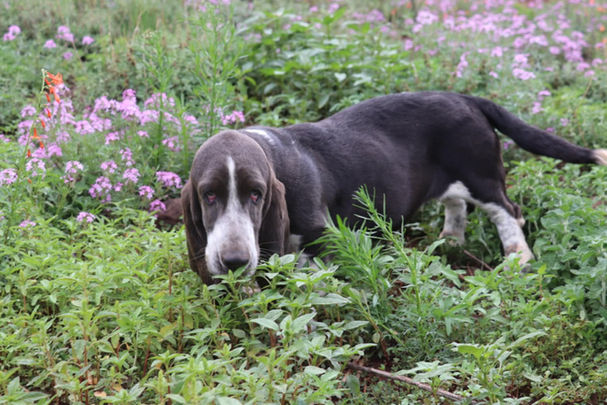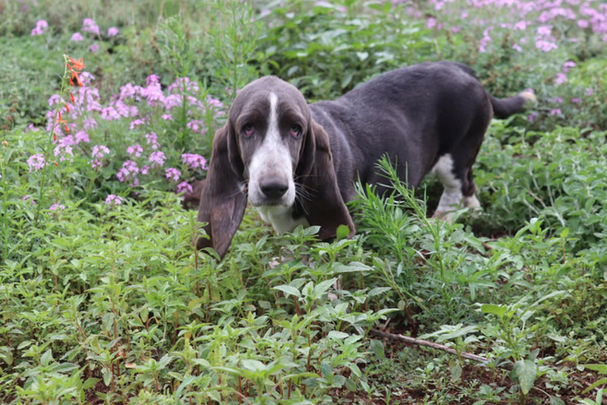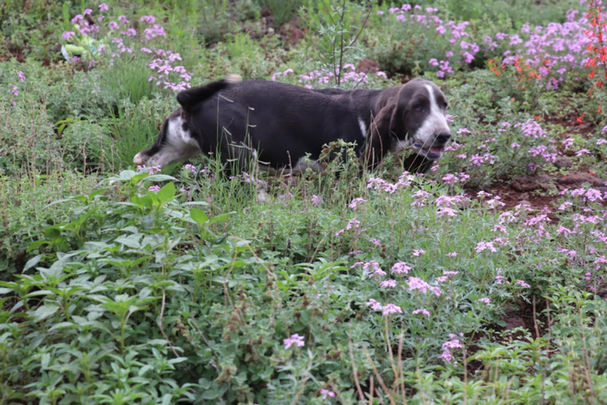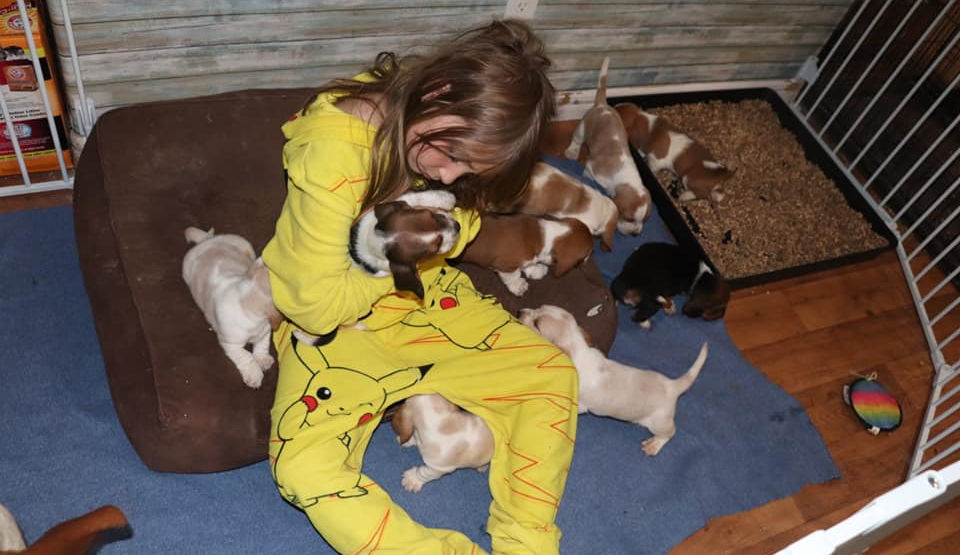
Who says you can't buy love???
How We Raise Our Dogs
We've been asked many times how we raise our puppies.
So I figured it might be helpful to put a page up and give you some details!
Our fur babies are just that, fur babies. They are apart of the family and continue to be until they go to new homes that love them just as much! From the moment of birth, puppies are handled. We are very active in helping our bassets through their birthing process as this can be very difficult for them. They get very tired and many times need assistance. I sit with my bassets as each baby is born. I comfort her and let her know she's not alone. We monitor the birth of each fur baby as they are very special to us. Mama hounds get special treatment through pregnancy and whelping. And of course, they need lots of calories to keep those babies chunky and healthy! From the moment baby bassets come into the world, they are loved and cuddled so they are ready to go home to you!
At 0-14 days, we keep our fur dumplings warm, safe and mama well fed. We holistically raise our puppies with Puppy Culture socialization program. We may need to supplement feed larger litters. But their whelping area is a large space with heat and a whelping rail to protect them from mama laying on them. We start socializing immediately. We touch them, we cuddle them, we kiss them. We touch their ears, toes, feet, tails, hold them upside down, and pre-spoil them. We want them to know human touch and love immediately. At this age, puppies are heat seeking milk missiles. Lol! Their neurological development happens a lot at 0-14 days. Early Neurological Stimulation is extremely important and can shape the puppy for the rest of their lives! This is when your breeder is extremely important.
As puppies get older, their whelping area changes to meet their needs. At 3-4 weeks, we start potty training, texture differences, and eating on their own! We start healthy mush for puppies, potty training to a designated area, and of course, continuing socializing them in many ways. We spend many hours with these babies and get to know their personalities, so that we can help you to find the best fit for your family, not just get you a cute puppy! We do not allow visits for the protection of our puppies. Too many things are dangerous to them without vaccinations, and we have an obligation to keep your puppy and every other puppy safe and healthy while they are in my care. We take this obligation very seriously!
At 5 weeks, puppies get slides and wobble boards. They learn balance, mobility, and joint strength with wobble boards. The slide gets their minds working and they love to master the slide. Once they do, it is countless hours of fun! Puppies learn how to ask for attention by manding. You will see videos of our puppies sitting at the edge of the pen instead of jumping to ask for attention and treats. Puppies learn how to use their teeth at this age. We give them foods they have to chew and tear apart. It teaches them how to gag and bring food out of their throats if needed. This is important! They are dogs after all! They put all kinds of things in their mouths that they are not supposed to! Mom is teaching them bite pressure and letting them know when they hurt her. They also learn when biting each other and their sibling cries. Again, these are important life lessons that will apply to their families in the future!
As they get to 6-7 weeks, they are weaning. Spending less time feeding from Mom and more time learning about life! They are adventuring outside now, learning about smooth surfaces, rough surfaces, grass, dirt, and so many things to mention. Our babies are getting ready for you to take them home! They are learning how to eat mom's food. They go for their first car ride! They have leashes put on and starting to learn already that leashes are a good thing that means adventure! Not Fear!
At 7-9 weeks we allow puppies to learn how to be hounds with their mom. They are weaned from milk and eating solid foods, but they are still learning from mom. Learning that their teeth hurt! Learning that potty training transitions to outside! They learn how to use a doggy door. They see the vet. They get their microchip, examination, and have all these records when they go home so you know what they need next! They go through a fear stage at 8-9 weeks and that is when most breeders send their dogs home. We protect our puppies from this stage and keep them with their mom and litter mates until this stage passes. This allows them to go through their last fear stage in a confident manner and then when you get your puppy at 9-10 weeks, you can work on the last socialization without fear.
At 9-10 weeks, I allow them to start going home! They have had the best start to socialization but don't forget, it continues with you! There will be many vet visits in the week to come, training sessions and cuddles! I do ask that your baby is seen within 3 days of going to their new homes so that their new vet can verify that my vet didn't miss anything! We are all human and we make mistakes. But I have my puppies seen by a vet before families are able to pick their puppy so that we know each and every puppy is healthy before they are picked up to save our families from any possible heartache!
The benefits of litter training have us in awe! We are so happy we decided to litter train and will never go back! Our puppies go to their new homes already used to going to a certain place to go potty and seek it out. They go to their new homes already 90-95% potty trained! This is a LIFE SAVER and I promise you will be happy! Buy the same litter we do- equine pine pellets from Tractor Supply, make a litter box for your pup in an exersize pen and then slowly transition to outside and then pour some of the litter directly on the ground where you want your pup to potty and it will be the easiest training transition ever!




































